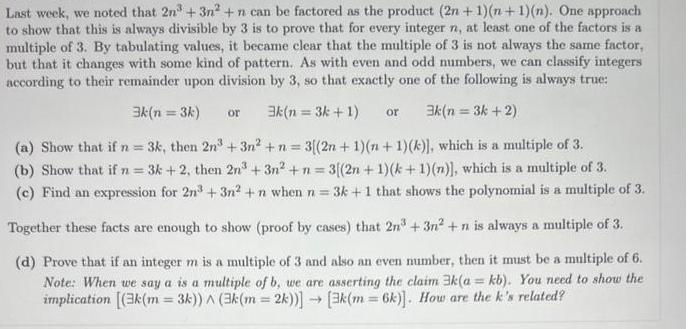Answered step by step
Verified Expert Solution
Question
1 Approved Answer
Last week, we noted that 2n + 3n +n can be factored as the product (2n +1)(n+1)(n). One approach to show that this is

Last week, we noted that 2n + 3n +n can be factored as the product (2n +1)(n+1)(n). One approach to show that this is always divisible by 3 is to prove that for every integer n, at least one of the factors is a multiple of 3. By tabulating values, it became clear that the multiple of 3 is not always the same factor, but that it changes with some kind of pattern. As with even and odd numbers, we can classify integers according to their remainder upon division by 3, so that exactly one of the following is always true: 3k(n = 3k) or 3k(n = 3k + 1) or 3k(n = 3k + 2) (a) Show that if n = 3k, then 2n +3n+ n=3[(2n+ 1)(n+1)(k)], which is a multiple of 3. (b) Show that if n = 3k + 2, then 2n +3n+n=3[(2n + 1)(k+ 1)(n)], which is a multiple of 3. (c) Find an expression for 2n + 3n +n when n = 3k + 1 that shows the polynomial is a multiple of 3. Together these facts are enough to show (proof by cases) that 2n +3n +n is always a multiple of 3. (d) Prove that if an integer m is a multiple of 3 and also an even number, then it must be a multiple of 6. Note: When we say a is a multiple of b, we are asserting the claim 3k(a= kb). You need to show the implication [(3k(m=3k)) ^ (3k(m=2k))] [3k(m=6k)]. How are the k's related? ->
Step by Step Solution
★★★★★
3.47 Rating (160 Votes )
There are 3 Steps involved in it
Step: 1

Get Instant Access to Expert-Tailored Solutions
See step-by-step solutions with expert insights and AI powered tools for academic success
Step: 2

Step: 3

Ace Your Homework with AI
Get the answers you need in no time with our AI-driven, step-by-step assistance
Get Started


